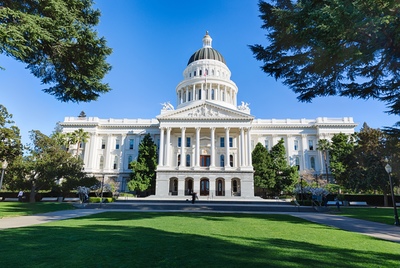
Compliance
Compliance Deadlines for Lobbying and Campaign Finance in March 2026
March 3, 2026 | Megan Zeiss, Vinnie Cannamela
November 5, 2024 | Hilary Smith
-e0adc9-1200px.jpeg)
Key Takeaways:
We saw an uptick in the number of organizations showing interest in election involvement this election season. Many organizations already engage in lobbying, and want to do more in the pivotal period leading up to election day. But before you jump in, it’s important to understand the differences between lobbying activity and campaign or political activity.
Generally, lobbying is an attempt to influence legislative, administrative, or executive action - many organizations dedicate resources to state-level lobbying efforts to promote a legislative agenda, obtain favorable rulemaking, secure state funding, or contracts. Lobbying primarily takes two forms:
Directly communicating with lawmakers to advocate for or against bills and laws; or
Indirectly advocating for change by encouraging or asking others to take action, commonly in the form of grassroots or grasstops efforts.
Direct lobbying can include meetings, phone calls, emails, meals, and receptions, and organizations that lobby can use corporate funds for this activity. Grassroots lobbying is usually associated with mass communication to mobilize or grow a base of support, and typically includes a call to action (such as “Call your state legislator and tell them to vote no!”). Common examples of grassroots lobbying formats include phone banks, ads on billboards, social media and other digital advertising, peer-to-peer text messages, and mass mailings. Grasstops advocacy, on the other hand, involves using existing connections that others have with policymakers to advance the organization’s policy agenda. Grasstops advocacy is usually associated with a more precise or targeted approach.
Lobbying is regulated at the federal, state, and local levels. Different jurisdictions require that individuals and organizations who lobby report the details of their lobbying activity including any gifts, meals, or other expenses they make on behalf of legislators. An organization may employ a lobbying firm or have employees engage in lobbying - and often they do both. The lobbyists (and often the organization) will have to register with the relevant jurisdiction and abide by ethics rules while engaging in lobbying.
Campaign or political activity is a distinct, albeit adjacent, set of activity. Political activity is regulated separately from lobbying, and subject to campaign finance laws of the jurisdiction where the activity takes place. If an organization wants to get involved in a federal race (U.S. House of Representatives, U.S. Senate, or the White House), that activity is regulated by the Federal Election Commission, no matter the candidate’s home state. At the state and local levels, various entities (often the Secretary of State) oversee elections and campaign finance compliance. Oversight and compliance with these state and local regulations can range from light-touch to onerous.
Organizations have two avenues for financing election activity: corporate funds (where permissible - corporations are prohibited from making direct contributions at the federal level, for example), and political action committee (PAC) funds. Political spending generally takes one of two forms:
Contributions to candidates or other political action committees (PACs); or
Expenditures that support/oppose candidates or ballot measures.
Contributions can either be monetary (a contribution given directly to a candidate’s committee) or in-kind (a donation of goods or services to the candidate’s campaign). Both types of contributions are regulated and usually subject to the jurisdiction’s contribution limits.
Organizations may also be interested in making expenditures that support or oppose candidates or ballot measures, commonly through advertisements that advocate for the election or defeat of a candidate, party, or ballot measure. Such expenditures may be made independently or in coordination with a campaign. A coordinated expenditure is made at the request of or in concert with a campaign (such as working with campaign staff to draft language for an ad) - but jurisdictions vary and coordinated expenditures may be prohibited or strictly limited. Where permitted, coordinated expenditures are treated as in-kind expenditures and subject to campaign contribution limits.
An independent expenditure occurs when an organization makes an expenditure to support or oppose a candidate or ballot measure without coordinating with a campaign or committee. Common examples include ads on cable, radio, billboards or social media. Independent expenditures are usually not subject to any limits, but in turn they must adhere to strict disclaimer requirements that vary by jurisdiction.
There are multiple types of ballot measures, including initiatives, referendums, and recalls. Citizen-led initiatives are more common in western states, and states are beginning to push back on these efforts.
When it comes to regulation and reporting, ballot measures have a foot in each realm. States generally treat ballot measure activity as campaign finance activity, often requiring a dedicated committee that must register and report on the same schedule as traditional PACs. For example, in Washington state, a committee formed to support or oppose a ballot measure falls under the definition of political committee and must register and report as such - including establishing a separate bank account and appointing a treasurer. At the federal level, ballot measure activity is treated as lobbying activity, which is particularly important for 501(c) organizations interested in engaging a state ballot measure while protecting their nonprofit status. 501(c)(3) organizations are limited in the amount of lobbying that they can do, and other 501(c) organizations will want to evaluate how ballot measure activity can bolster primary purpose spending.
Nonprofit organizations should also be aware of donor disclosure laws before engaging in any political activity, even nonpartisan ballot measure activity. A majority of states have adopted or are considering implementing laws which require nonprofit organizations to publicly disclose donors who give over a certain amount when the organization engages in permissible campaign activities.
Before engaging in lobbying, political activity, or any ballot measure activity, it is critical to know the rules of that jurisdiction. Not sure where to start? MultiState can help! Read more about our Compliance Services here, or get in touch here.

March 3, 2026 | Megan Zeiss, Vinnie Cannamela

February 20, 2026 | Bradley Coffey
-328a36-400px.jpg)
February 20, 2026 | Kelly Cox